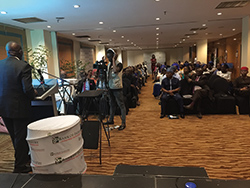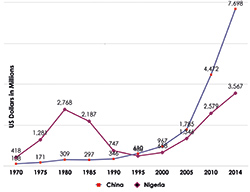CHINA-NIGERIA: LEVERAGE FOR NATIONAL GROWTH
09/19/16, Waheed Olagunju*

Mr Waheed Olagunju
China's industrialisation boom began with the "Great Leap Forward" initiative, which was an economic and social campaign developed by the Communist Party of China between 1958 and 1961. The industrial revolution was led by Mao Zedong, the then Chairman of the Central Committee of the Communist Party of China. The Great Leap Forward initiative was aimed at rapidly transforming the country from an agrarian economy driven by peasant farmers into a modern Communist one through agriculturalisation and industrialisation, which involved large scale physical and human capital investment.
In 1979, the Chinese government also launched several economic reforms which include the following: price and ownership subsidies for farmers; establishment of special economic zones for the purpose of attracting Foreign Direct Investments (FDIs); importing high - technology products; and decentralisation of economic policymaking. China built-up on and sustained its accelerated economic reforms to become the 2nd largest economy in the world with a GDP of $11.3 trillion in Q1-2016.
How China made it Big!
�Sustained National Savings and Capital Investment!
�Attracting FDI by making doing business easy!
�Enhancing Policy Support for Local Producers for export!
�Huge investment in Human and Physical Capital!
�Development of High Technology industrial sectors!
Comparing China-Nigeria GDP per capital Trend:
Nigeria recorded higher GDP per capita when compared to China in early years up until about 1995, when the Chinese GDP per capita overtook Nigeria's.
�China is the 2nd largest economy in the world with an estimated GDP of $11.3 trillion as at end of Q1-2016. United States comes in 1st with a size of over $17trillion.
�Nigeria is currently the 22nd largest economy in the world, and largest in Africa with a size of $568bn.
�1970 GDP/PC Rankings
Nigeria 88, China 114
�South Africa is the only African country on the G-20 group of nations, despite having a much lower GDP than Nigeria.

GDP per capita 1970-2014
China's foray in Africa: Bilateral Trade Statistics 2005-2014.<
>
China's total trade with Africa peaked at $222bn as at end of 2014. Through the past 10 years, export by African countries only exceeded imports from China in 2009, with the gap widening in subsequent years in favour of importation from China.
Other key facts about China-Africa Trade
�China is currently Africa's largest trading partner, surpassing the United States in 2009. In that year China-Africa trade was $91bn, while US-Africa trade was about $89bn.
�China's trade with Africa is only 5% of its global trading activities.
�More than 1million Chinese citizens, most of them labourers and traders, have moved to Africa in the past decade.
�Crude Oil, raw materials and resources constitute a huge percentage of Chinese imports from Africa.
�South Africa is China's largest trading partner in Africa, at a volume of $20.2 billion. Yet this is 4% of China's trade with the European Union (EU). Nigeria is 3rd largest trading partner of China in Africa and also the 2nd biggest market of China's exports to Africa.
Trade relations between Nigeria and China:
Between 2000 and 2010 total trade volume between these countries grew by about 800% - from $860m in 2000 to $7.7bn by 2010. As at 2014, total trade between the countries stood at $13bn.
Key facts:
�Nigeria is 3rd largest trading partner of China in Africa and also the 2nd biggest market of China's exports to Africa
�More than 70% of Nigeria's imports come from China
�Bilateral trade with Nigeria represents over 30% of its west African trade volume
�Nigeria's imports from China exceed its exports to the country. In 2008, imports from China exceeded exports to the country by over 12 times.
�China's import from Nigeria are primarily Crude Oil and Agricultural products especially Cassava chips.
�Over one million metric tonnes of cassava chips are exported to China on an annual basis
.jpg)
China Trade trend in Africa (USD Bn.)
Outcome of the maiden Presidential visit to China in April 2016
The recent visit to China by President Muhammadu Buhari yielded investment commitments of at least $6bn to Nigeria in key sectors of the economy.
An agreement of $2.5bn was signed for the development of the Lagos Metro Rail Transit Red Line project.
$1bn is to be invested in the development of a Greenfield expressway for Abuja-Ibadan-Lagos under an agreement reached by the Infrastructure Bank and Sinohydro Corporation Limited.
North South Power Company Limited and Sinohydro Corporation Limited signed an agreement valued at $478m for the construction of 300 Mega Watts solar power in Shiroro, Niger State.
Infrastructure Bank and Sinohydro Corporation Limited also sealed a $250m deal to develop an ultra-modern 27-storey high rise complex.
Granite and Marble Nigeria Limited and Shanghai Shibang signed an agreement valued at $55m for the construction and equipping of granite mining plant in Nigeria.
What Nigeria must do sustainably in the next 10 - 20 years!
Nigeria has built a strong bilateral relationship with China for several decades, which must be strongly leveraged in the next 10-20 years to ensure sustained economic growth of the country:
�Leverage relationship with China to create economic zones and industrial parks towards enhancing development of local businesses and attracting more FDIs.
�Enhance Foreign Direct Investment into the country by creating value-add incentives to foreign investors and also ensure a significant improvement in Nigeria's profile with regards to ease of doing business
�Add value to the largely raw export products (especially cassava chips) to China through benefaction.
�Leverage relationship to develop and sustain depth of infrastructural development of the country. This is fundamental to Nigeria's industrialisation goals.
�China - best source of concessional funding (loans & grants) in today's world and suitable / functional technology-FOCAC $60bn - Set Up Implementation Committee
�Dedicate significant resources to human capital development- Highly disciplined society - Positive attitude
Quality of work force: Private Sector Development

From left: Sir Vince Cable, Yun Sun and
Waheed Olagunju, at the China-Nigeria
Summit
Mexico too became industrialised!
Mexico and Nigeria are countries with similar demography and economic history in terms of dependence on crude oil. However, Mexico has been able to effectively diversify its economy and its GDP is currently $1.28 trillion (over 2 times that of Nigeria).
Other Key Comparisons
Nigeria Mid 1970's 2015
Crude Oil export 90% 90%
Non-Oil export 10% 10%
Mexico Mid 1970's 2015
Crude Oil export 80% 20%
Non-Oil export 20% 80%
(Manufactured Goods)
Source of Foreign Exchange (USD)
The Mexican government promoted industrial expansion through huge and sustained public investment in agriculture, energy, and transportation infrastructure. l
*Excerpts from paper presented by Mr. Waheed Olagunju, acting group managing director, Nigeria's Bank of Industry.
Comment on this story



